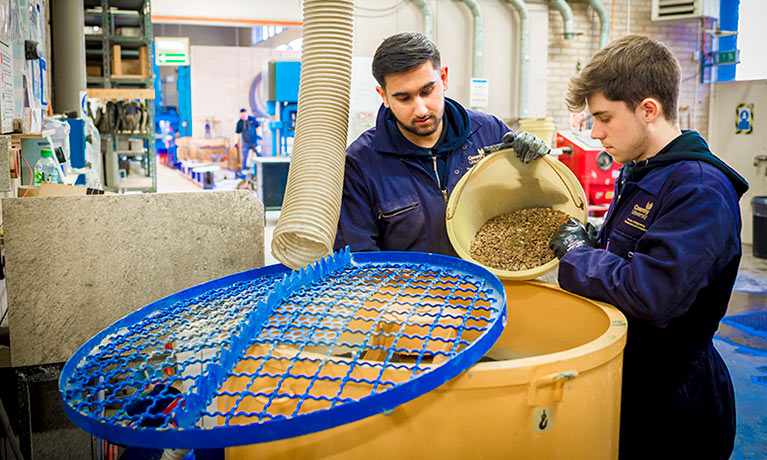Search
Quantity Surveying and Commercial Management BSc (Hons)
Study level: Undergraduate
Quantity Surveying and Commercial Management (QSCM) is a course aimed at those wishing to enter the construction industry dealing with financial planning and control and legal aspects at a professional level.
Course features
Course option
Year of entry
Location
Coventry University (Coventry)
Study mode
Full-time
Sandwich
Duration
3 years full-time
4 years sandwich
UCAS codes
K240
Start date
September 2025
The information on this page is for 2024-25 entry and should be used as guidance for 2025-26 entry. Please keep checking back on this course page to see our latest updates.
Course overview
This course covers construction cost estimating, including aspects of refurbishment and maintenance cost, procurement, quantification of elements using both traditional and electronic techniques, value management and contract/commercial issues.
- The course will use live, upcoming or recently completed projects to enable application of skills and knowledge learnt in an industry-specific and contextualised manner.
- Our strong links with industry and the Royal Institute of Chartered Surveyors (RICS) means that course delivery is mapped to employment needs, helping to make the transition to employment easier upon successful graduation.
- Course content aims to develop contemporary skills such as the use of digital software for quantification and cost management.
- Research-led teaching aims to ensure you are at the forefront of knowledge when entering the industry as a graduate.
Joint Top Modern University for Career Prospects
Guardian University Guide 2021 and 20225 QS Stars for Teaching and Facilities
QS Stars University RatingsTop 5 UK Student City (Coventry)
QS Best Student Cities Index 2023Why you should study this course
- A common first year makes it possible to transfer to our degree-level courses in Architectural Technology, Construction Project Management or Building Surveying in the second year if you wish, after successful completion of Year one (subject to meeting progression requirements).
- Current collaborative links with universities in 20 countries around the world, giving you the chance for you to spend part of your studies abroad2.
- Opportunity to gain additional professional qualifications (at no extra cost, subject to application) as well as your degree, upon successful completion – an Autodesk certificate in Computer Aided Design (CAD) and chance to undergo a Building Research Establishment Energy Assessment Method (BREEAM) to become an Accredited Graduate (BREEAM AG).
- Study on shared modules alongside students on a wide range of other professional disciplines, such as, construction management, architectural technology, building surveying, building services engineering and civil engineering, reflecting the interdisciplinary nature of today’s construction industry.
- Our Simulation Centre allows us to provide you with not only the opportunity to gain theoretical knowledge and skills but also the chance to develop the ability to apply this knowledge to realistic industrial situations within a safe environment4.
Accreditation and professional recognition
The degree is accredited1 and recognised by the following bodies:

Royal Institution of Chartered Surveyors (RICS)
The BSc (Hons) Quantity Surveying and Commercial Management degree at Coventry is accredited by the Royal Institution of Chartered Surveyors (RICS) to start graduates along a recognised pathway to chartered membership. Accreditation is a continuous process with the current agreement in place until 20251.
What you'll study
We regularly review our course content, to make it relevant and current for the benefit of our students. For these reasons, course modules may be updated.
How you'll learn
With a focus on your future employability, you will have several opportunities to accelerate your professional development. In your first year, you have the option to undertake a Computer Aided Design (CAD) assessment (at no extra cost, application required) and, if successful, will receive industry recognised Autodesk certification.
Then, in your second year, you will have the opportunity to undertake a Building Research Establishment Energy Assessment Method (BREEAM), which, on successful completion, enables you to become certified as an Accredited Graduate (BREEAM AG) (at no extra cost, application required). BREEAM is widely acknowledged as the leading environmental assessment method – which sets the standard for best practice in sustainable building design, construction and operation. It has become one of the most comprehensive and widely recognised measures of environmental performance.
Teaching contact hours
We understand that everyone learns differently, so each of our courses will consist of structured teaching sessions, which can include:
- On campus lectures, seminars and workshops
- Group work
- Self-directed learning
- Work placement opportunities2.
If you would like more information, you can request information about teaching hours.
The number of contact hours may vary from semester to semester, however, on average, it is likely to be around 14-15 contact hours per week in the first and second year dropping to around 11 contact hours per week in the final year as you become a more independent learner.
In addition, you will be expected to undertake approximately 30-35 hours of self-directed study per week depending on the demands of individual modules. This self-directed learning allows you to use your research skills, consolidate your knowledge or undertake collaborative group work. The contact hours may be made up of a combination of face-to-face teaching, individual and group tutorials, and online classes and tutorials.
As an innovative and enterprising institution, the university may seek to utilise emerging technologies within the student experience. For all courses (whether on-campus, blended, or distance learning), the university may deliver certain contact hours and assessments via online technologies and methods.
Since COVID-19, we have delivered our courses in a variety of forms, in line with public authority guidance, decisions, or orders and we will continue to adapt our delivery as appropriate. Whether on campus or online, our key priority is staff and student safety.
Assessment
This course will be assessed using a variety of methods which will vary depending upon the module.
Assessment methods include:
- Formal examinations
- Phase tests
- Essays
- Group work
- Presentations
- Reports
- Projects
- Coursework
- Exams
- Individual assignments
- Laboratories
- Posters
The Coventry University Group assessment strategy ensures that our courses are fairly assessed and allows us to monitor student progression towards achieving the intended learning outcomes.
International experience opportunities
Construction is a global industry with the demand for building professionals overseas set to rise dramatically. The United Nations has identified nine countries, which will account for half the world’s population growth between now and 2050: India, Nigeria, Pakistan, the Democratic Republic of Congo, Ethiopia, Tanzania, the US, Indonesia and Uganda.
The content of the course continuously refers to the international context in which construction takes place, which gives an international perspective to your studies and potential future career as a construction manager.
During the course, you should have the option of participating in an international field trip2, which provides the opportunity to experience the built environment in other countries.
If you opt for a sandwich year, you can spend time studying abroad2; we currently have links with other Universities in Malaysia, Oman, Canada, France, Germany, Spain, Italy, Poland and the Netherlands, which provide opportunities for student exchanges and student workshops and projects.
The course is developed with both industry and accrediting professional bodies needs in mind. This ensures that the graduates leaving this course are in demand and will have the necessary skills to not only secure their graduate position but also progress within their chosen sector quickly.
Dave Roberts, Course Director, Quantity Surveying and Commercial Management, quoted July 2022

Entry requirements
Typical offer for 2024/25 entry.
Not got the required grades? We offer this degree with an integrated foundation year.
Fees and funding
| Student | Full-time | Part-time |
|---|---|---|
| UK, Ireland*, Channel Islands or Isle of Man | 2025/26 fees TBC 2024/25 fees - £9,250 per year |
Not available |
| EU | 2025/26 fees TBC 2024/25 fees - £9,250 per year with EU Support Bursary** 2025/26 fees TBC 2024/25 fees - £19,850 per year without EU Support Bursary** |
Not available |
| International | 2025/26 fees TBC 2024/25 fees - £19,850 per year |
Not available |
If you choose to study this course with a professional placement2 or study abroad year, you will need to pay a tuition fee3 of £1,250 to cover your academic support throughout your placement year.
For advice and guidance on tuition fees and student loans visit our Undergraduate Finance page and see the university’s Tuition Fee and Refund Terms and Conditions.
The university will charge the tuition fees that are stated in the above table for the first Academic Year of study. The university will review tuition fees each year. For UK (home) students, if Parliament permits an increase in tuition fees, the university may increase fees for each subsequent year of study in line with any such changes. Note that any increase is expected to be in line with inflation.
For international students, we may increase fees each year, but such increases will be no more than 5% above inflation. If you defer your course start date or have to extend your studies beyond the normal duration of the course (e.g. to repeat a year or resit examinations) the university reserves the right to charge you fees at a higher rate and/or in accordance with any legislative changes during the additional period of study.
We offer a range of International scholarships to students all over the world. For more information, visit our International Scholarships page.
Tuition fees cover the cost of your teaching, assessments, facilities and support services. There may be additional costs not covered by this fee such as accommodation and living costs, recommended reading books, stationery, printing and re-assessments should you need them.
The following are additional costs not included in the tuition fees:
- Any optional overseas field trips or visits: £400+ per trip.
- Any costs associated with securing, attending or completing a placement (whether in the UK or abroad).
Find out what's included in your tuition costs.
Other additional costs
- Mandatory international field trips: Typically between £200 and £400 per trip
*Irish student fees
The rights of Irish residents to study in the UK are preserved under the Common Travel Area arrangement. If you are an Irish student and meet the residency criteria, you can study in England, pay the same level of tuition fees as English students and utilise the Tuition Fee Loan.
**EU Support Bursary
Following the UK's exit from the European Union, we are offering financial support to all eligible EU students who wish to study an undergraduate or a postgraduate degree with us full-time. This bursary will be used to offset the cost of your tuition fees to bring them in line with that of UK students. Students studying a degree with a foundation year with us are not eligible for the bursary.
Facilities
The £50m Engineering and Computing Building and new £25m Beatrice Shilling Building are designed to support hands-on learning. Our Sir John Laing Building also houses a variety of industry-standard labs and equipment. Our aim is to offer you sector-leading facilities4.

Materials laboratory
Includes industrial standard timber and steel workshops, a concrete mixing area with three pan mixers, programmable environmental chambers, a range of ovens and curing tanks and various materials testing apparatus.

Simulation Centre
Our interactive training centre includes a ‘virtual’ construction site with fully equipped site cabins and an observation deck. Here, you can take part in role-play exercises to prepare you for a range of situations in the workplace.

Computer suite/CAD facility
The study of digitised quantification requires an in-depth knowledge of relevant software such as CATO, CAD Measure, BIM Measure and Cost X, as well as a working understanding of CAD design software. Our computer facility has top-rated computer hardware to enable the practice of using these on projects.
Careers and opportunities
On successful completion, you will have knowledge of:
- Economics of construction.
- The legal and regulatory framework within which buildings are constructed.
- Procurement and contract administration procedures.
- Current innovations relating to the construction of buildings.
- Building technology and construction processes.
- Management processes and systems associated with construction.
- Building science with respect to materials, structure, services and internal environment.
- Design processes used in construction.
- How quality is achieved in construction processes and products.
- Health and safety in building design and construction.
On successful completion, you will be able to:
- Analyse, interpolate and present information.
- Analyse and solve construction problems of a technical and managerial nature.
- Analyse data and information sources in construction.
- Develop price estimates and cost budgets.
- Analyse financial information and cost budgets.
- Undertake procedures associated with project management.
- Prepare pre-contractual documentation.
- Prepare valuations and claims.
- Assess stage payments.
Quantity surveyors and commercial managers play a pivotal role in the delivery of every construction projects; career prospects can exist wherever new projects are being contemplated, or where facilities are being refurbished, or where building work requires professional control. This is a global profession, so career prospects may be worldwide.
Coventry University is committed to preparing you for your future career and giving you a competitive edge in the graduate job market. The University’s Talent Team provide a range of support services to help you plan and prepare for your career.
Where our graduates work
Our previous graduates have found employment in private practices, contracting organisations, commercial organisations and local/central government, regionally, nationally and internationally. They have gone on to work with companies such as Mace, Galliford Try, Balfour Beatty plc, Laing O’ Rourke, Barrett Homes, Watts Construction Ltd, and BAM Construct UK.
Graduate Immigration Route visa
Based on current information from the UK Government, international students whose study extends beyond summer 2021 may be eligible for a visa under the UK Government’s Graduate Immigration Route, which will enable students to stay and work, or look for work, in the UK at any skill level for up to two (2) years. Check the most up to date guidance available to check your eligibility and any updates from the UK Government before making an application or enrolment decision.
How to apply
You may also like

Architectural Technology BSc (Hons)

Building Surveying BSc (Hons)




